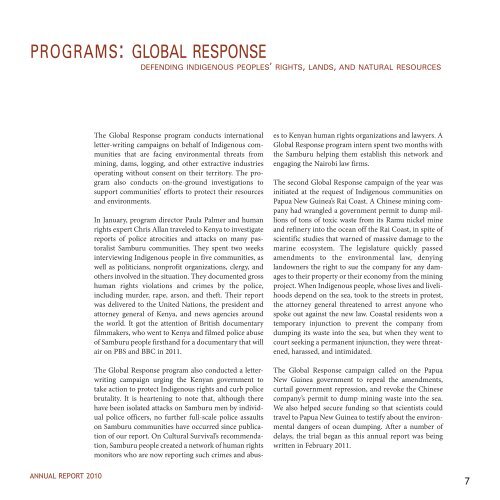Annual Report 2010 - Cultural Survival
Annual Report 2010 - Cultural Survival
Annual Report 2010 - Cultural Survival
Create successful ePaper yourself
Turn your PDF publications into a flip-book with our unique Google optimized e-Paper software.
PROGRAMS: GLOBAL RESPONSE<br />
ANNUAL REPORT <strong>2010</strong><br />
DEFENDING INDIGENOUS PEOPLES’ RIGHTS, LANDS, AND NATURAL RESOURCES<br />
The Global Response program conducts international<br />
letter-writing campaigns on behalf of Indigenous communities<br />
that are facing environmental threats from<br />
mining, dams, logging, and other extractive industries<br />
operating without consent on their territory. The program<br />
also conducts on-the-ground investigations to<br />
support communities’ efforts to protect their resources<br />
and environments.<br />
In January, program director Paula Palmer and human<br />
rights expert Chris Allan traveled to Kenya to investigate<br />
reports of police atrocities and attacks on many pastoralist<br />
Samburu communities. They spent two weeks<br />
interviewing Indigenous people in five communities, as<br />
well as politicians, nonprofit organizations, clergy, and<br />
others involved in the situation. They documented gross<br />
human rights violations and crimes by the police,<br />
including murder, rape, arson, and theft. Their report<br />
was delivered to the United Nations, the president and<br />
attorney general of Kenya, and news agencies around<br />
the world. It got the attention of British documentary<br />
filmmakers, who went to Kenya and filmed police abuse<br />
of Samburu people firsthand for a documentary that will<br />
air on PBS and BBC in 2011.<br />
The Global Response program also conducted a letterwriting<br />
campaign urging the Kenyan government to<br />
take action to protect Indigenous rights and curb police<br />
brutality. It is heartening to note that, although there<br />
have been isolated attacks on Samburu men by individual<br />
police officers, no further full-scale police assaults<br />
on Samburu communities have occurred since publication<br />
of our report. On <strong>Cultural</strong> <strong>Survival</strong>’s recommendation,<br />
Samburu people created a network of human rights<br />
monitors who are now reporting such crimes and abus-<br />
es to Kenyan human rights organizations and lawyers. A<br />
Global Response program intern spent two months with<br />
the Samburu helping them establish this network and<br />
engaging the Nairobi law firms.<br />
The second Global Response campaign of the year was<br />
initiated at the request of Indigenous communities on<br />
Papua New Guinea’s Rai Coast. A Chinese mining company<br />
had wrangled a government permit to dump millions<br />
of tons of toxic waste from its Ramu nickel mine<br />
and refinery into the ocean off the Rai Coast, in spite of<br />
scientific studies that warned of massive damage to the<br />
marine ecosystem. The legislature quickly passed<br />
amendments to the environmental law, denying<br />
landowners the right to sue the company for any damages<br />
to their property or their economy from the mining<br />
project. When Indigenous people, whose lives and livelihoods<br />
depend on the sea, took to the streets in protest,<br />
the attorney general threatened to arrest anyone who<br />
spoke out against the new law. Coastal residents won a<br />
temporary injunction to prevent the company from<br />
dumping its waste into the sea, but when they went to<br />
court seeking a permanent injunction, they were threatened,<br />
harassed, and intimidated.<br />
The Global Response campaign called on the Papua<br />
New Guinea government to repeal the amendments,<br />
curtail government repression, and revoke the Chinese<br />
company’s permit to dump mining waste into the sea.<br />
We also helped secure funding so that scientists could<br />
travel to Papua New Guinea to testify about the environmental<br />
dangers of ocean dumping. After a number of<br />
delays, the trial began as this annual report was being<br />
written in February 2011.<br />
7


